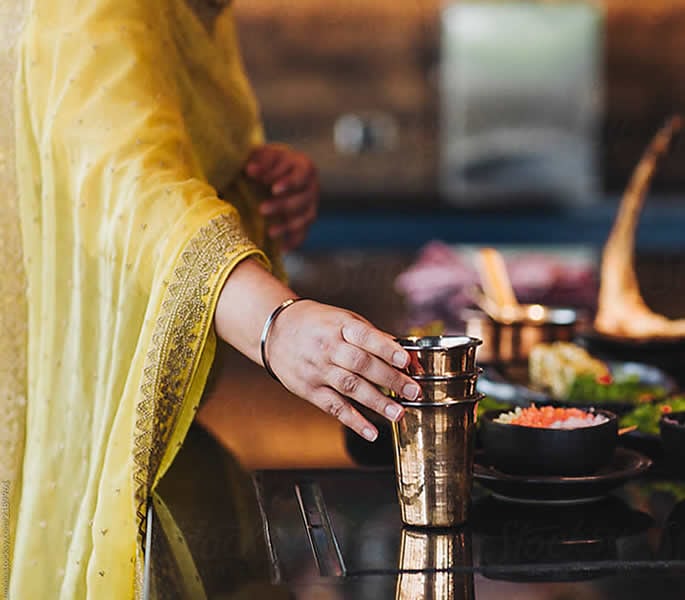"When I was pregnant, all I heard from the aunties and relatives was it's going to be a boy"
The role of women in Desi homes is evolving. But gender discrimination still has its place in a Desi home and perhaps is not changing as quickly as anticipated.
From the early days of being literally being married to a complete household, many Desi women today are enjoying their freedom and independence.
However, for most the story is still no different compared to decades ago. Women are still being seen a secondary to men and do not have the same privileges.
Many women, especially those who have sheltered upbringings and strict households, still see it as normal and fully accept their place in the home.
Some even accept that there is no other way and show tremendous respect towards living in a very traditional manner, where men are the dominant party, making all the decisions.
We take a look at how gender discrimination exists in Desi homes and how women are either accepting it or rejecting it.
The History
In the past, the role of a Desi male and female was clearcut and set in stone. It had been this way for our ancestors and even followed by our parents and grandparents. Nobody challenged the customs and no one labelled it ‘gender discrimination’.
Men have always been seen as the providers of the family, their role has always been to be out on the field, in the markets and where they can make money.
Women, on the other hand, would be the caretakers of the house and children.
There was hardly any concept of sharing roles.
Many of the men who married during that era, were judged on their wealth, family status and job. Whereas, women were chosen on their abilities to become housewives with full capabilities to cook, do household chores and become mothers of children.
It was a custom in all Desi families in the early days and they knew no different.
Men and women knew their roles and responsibilities and there was no ‘grey’ area or expectations.
Then, when people from South Asia migrated to Western countries, this way of life continued.
Men came over to Britain primarily to work and send money back home. At first, they left their wives and families back home.
Once the women arrived when men decided to stay, the women immediately took on the role to look after the home and children.
Majority of women were illiterate and therefore, knew very little about the country they came to. They relied on the working men for the integration mainly.
Early generations of British Asian men and women married young in their teenage years. Most women were not allowed to go onto further education and were pulled out of school for marriage.
Education was seen as something that men did and not women.
Once married, the role of the women was to take over all domestic duties at her husband’s home.
Anita, aged 59, from Birmingham says:
“I was married at 16. I had no say in it and accepted my parents choice of my husband from India. After marriage, my life was all about being the homemaker. I had children and took care of the family including my in-laws. He worked hard and took care of everything else.”
There was this concept of where the mother-in-law could retire from doing household duties once the son would marry. The daughter-in-law would then take on the duties and meet the demands of her mother-in-law and husband’s family.
As times changed, Desi women began to learn English at community centres and gradually did enter the world of work because finances became an issue for many households living in the UK.
Most of them ended up working in factories doing labour intensive jobs including sewing clothing products at home for companies, packing goods and using machinery.
Another option was to be part of family businesses due to their lack of higher education.
However, generations of British Asian women went onto getting highly educated and sought professions and careers, unlike their older counterparts.
Today, as Desi women have become much more educated and independent, the tradition of living with the in-laws is gradually decreasing and couples are living independently after marriage.
Simi, aged 21, from Derby says:
“I hear the stories from my grandmother of how they lived their life as ‘obedient women’ and accepted traditional ways. I don’t think I could live like that because it’s so suffocating and repressive.”
Thus, changing the compass of how Desi families function internally both in terms of managing the home and their roles. But this does not mean the discrimination has completely disappeared.
Gender Preference
If there is one thing that is prominent in Desi culture, it is that of having a male child.
Whilst it is a trend in poorer villages in South Asia, educated families, and some British born mothers also have this mindset.
You would expect Desi men to have this desire more, but it is, in fact, the women who have an increased yearning towards this wish. Often, due to the pressures and expectations of Desi society around them.
In South Asia, people want sons because they will take on the family name, work and bring wealth into the family, and be there for their parents in old age.
While girls are seen as a burden and costly. Having a girl means getting her married which would include dowry costs, money for the wedding and engagement.
It would come as a financial loss to them as she would, in the end, leave them for her own marital home and family.
This traditional thinking has passed on through generations and girls are still discriminated against even today. In India, states like Punjab having abnormally high sex-selected abortions and foeticides.
Meena, aged 27, from Leeds, says:
“When I was pregnant, all I heard from the aunties and relatives was it’s going to be a boy. It’s the way ‘you are carrying’ or the ‘glow you have’. When I had her, I felt I let everyone down and alienated because it was a girl.”
So, gender discrimination in Desi society even starts before a child is born into a home.
Once born, it does not get any easier for Desi girls.
In traditional Desi homes, the rules are completely different for boys and girls.
In fact, the rulebook often applies to the girl because a family is judged by their daughter’s status and respect. Some still believe a girl holds the ‘izzat’ of the family and therefore, must be perfect.
There are families where the boy behaves like a delinquent, is failing at school and part taking illegal activities. But the parents will, however, overlook this and say things like ‘it doesn’t matter, he’s a boy’.
Whereas, if a girl goes out even to the town centre with some friends, it can be seen unacceptable behaviour.
In fact, women are given a deadline for when they need to be home by and this often includes coming home before it gets dark.
This is not necessarily for safety but because if family members or relatives see her, they will ‘talk’ and news will spread about them being ‘bad’ and ‘given too much freedom’.
Desi mothers tend to molly cuddle their sons more than their daughters and give them the priority.
Shagufta, aged 29, from Birmingham, says:
“I was born in between two brothers. They started to get away with doing much less than me in the home. I would have to help my mother. They just watched TV or went out when they liked. If I complained my mother would just laugh and say you’re a girl, you can’t just go out.”
This, in some ways, has worked out better for the girls because they have emerged with stronger characters through time. Whereas, the boys find it hard to be completely independent of their motherly care.
Cultural Expectations of Women
Cultural expectations of Desi women vary from family to family.
Some have very radical views on how women should be allowed to behave in a Desi household. Females from such families are given a strict upbringing and a large set of rules.
These women are restricted from education and the outside world and their parents prepare them to be the perfect future daughter-in-law.
Being the perfect daughter-in-law involves having profound culinary skills, being able to look after children and managing an entire household without fault.
Arpita, aged 42, from Manchester, says:
“I was the youngest of all my brothers. I was taken out of school before I finished but my brothers were fully encouraged to follow their dreams.
“I wore salwar kameez always in the home. I learnt to cook at the age of ten and made Desi food for everyone in the home. I washed and cleaned as told to do by my mother.
“I was never allowed to go out unless I was with my parents or even watch television for long. I had no real friends. To be honest, I do feel pretty angry now looking back.”
There are still Desi families who impose on their daughters in this manner.
Many younger British-born Desi women are alien to this and have rebelled against it.
Sadly, in the past and still, the rebellion for some has led to forced marriages and honour-based crimes.
The crimes of which are often committed by male members of the family but some with women joining in too. Women under these circumstances are expected to see their brother, husband and parents-in-law as authority figures. If they disagree, violent abuse is often the outcome.
However, the majority of Desi families have evolved towards modern thinking. Young women have much more power and say over how they want to live their life.
Many girls are marrying in their late 30s, living away from home while studying and working as professionals with the support of their parents.
Tahira, aged 40, from Birmingham, says:
“What has changed is the attitude towards daughters.”
“Now people mostly see their daughters as independent and let them have lots of freedom and not let them do the normal ‘desi’ daughter things like housework. But I think towards daughter in laws they still have the old fashioned mindset.”
Bindi, aged 36, from Leicester says:
“I want a different future for my daughters compared to what I went through. I had an arranged marriage at 18 and lived with my in-laws. My husband was supportive but I was left to do everything, including looking after his parents and my children at the same time.”
Education, Work, and Marriage
Many Desi girls find it difficult to balance education, work and marriage due to cultural expectations and restrictions.
From an early age, parents who were willing to allow their daughters to work had made it clear on jobs which were most suitable.
Often jobs which are more female dominated are preferred by Desi parents because it helps a girl maintain her ‘izzat’.
Whereas jobs, where she is involved with too many male colleagues, will influence her to be more opinionated, too independent, and therefore, will instigate a fear that she will no longer be Desi wife material.
Sejal, aged 25, from Luton, says:
“I was told by my parents after getting my degree, I can only work in a place with more women than men. I had to fight back because I was not going to let them pigeonhole me into something I am not.”
This opinionated and independent female personality is also feared by some Desi men. Strong minded women often can affect Desi marriages. They either make them or break them.
Kiranjit, aged 26, from Coventry, says:
“When I got married, I thought it was going to be forever. But I found myself with a man who could not accept me challenging or questioning him. He wanted a wife who just did as she was told. I could not be her because all my life I studied and worked hard as much as he did to get to where I ended the marriage.”
The typical scenario much more acceptable is where women depend on the men as the leaders in the household and they manage all domestic duties.
Due to this, traditional parents will tell their daughters to go into careers like child care, health care and teaching which are seen as respectable for women. While other parents think its better for the daughter to marry young and then study if her husband ‘allows’ her to do so.
Maria, aged 24, from Birmingham says:
“As I was growing up, people the same age as me were getting married.
“In my opinion, I think it was a little early to make such a life-changing decision at such a young age.
“I believe you should be stable and have a better understanding of the world before getting into a committed long-term relationship.”
Furthermore, those in professional careers like managers or doctors still have to fulfil their duties as the ‘Desi wife’ after a hard days work. Many are expected to do housework and cook food for their husband and family regardless of having a job.
After marriage, having a job is seen as optional for women by some families and her real duty becomes the house. If a woman wants to work she is reminded that she will not be exempt from doing household chores like their other female members of the family.
Tahira continued and said:
“They [daughters-in-law] are still expected to look after the household and be the gracious host even if they have a full-time job.”
Gender discrimination remains to be a struggle for many Desi women, whether in South Asia or a diverse country like the UK.
While some families have evolved and daughters are excelling in the top professions, the dilemma of having a daughter and letting her be completely free to make her own life choices, for the majority, continue to be the same, when compared to the having a son.
However, younger generations of Desi women are speaking up and the culture is being challenged.
Men are also very slowly digressing from traditional cultural ways, by sharing domesticated roles in the household. Living with in-laws and extended families are also beginning to become less common, due to couples seeking to live on their own after marriage.
But, while cultural appropriation continues in Desi households, gender discrimination will still have its place. No matter how ‘modern’ South Asian society claims itself to be.
Therefore, the only way this will change is if it is challenged from within the homes by future generations, in order to develop a more balanced and harmonious environment of gender freedom and acceptance.
If this happens, only then will the issue of gender discrimination in Desi households, be a thing of the past.

































































